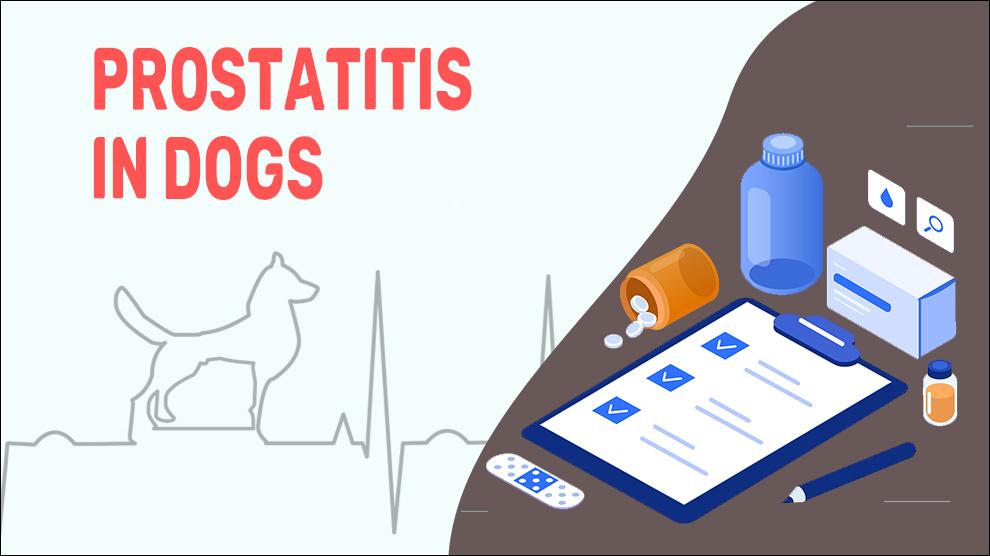The prostate is a bilobed, ovoid-shaped, mixed gland located immediately caudal to the bladder surrounding the proximal urethra and it secretes seminal plasma components.
Prostatitis is an infection of the prostate gland accompanied by painful inflammation.
Prostatitis is defined as a localized, intra-abdominal collection of purulent material containing little or no pancreatic necrosis that usually occurs in the vicinity of the pancreas.
While in most cases, the clinical presentation of Prostatitis is similar to that of Epididymitis (inflammation of the epididymis testicular tube), and most of the time, they are associated with benign prostatic hyperplasia.
This is common in non-neutered (intact) male dogs. It is usually mild, not often acute, and tends to resolve on its' own. When they do not, serious health issues can develop, such as pain, infection, fevers, urogenital, and copulation problems.
Symptoms Of Prostatitis
- Stranguria/dysuria (Difficulty urinating )
- Hematuria (Blood in the urine)
- Bloody or cloudy discharge from the penis
- Abdominal discomfort
- Frequent attempts to urinate
- Constipation, obstipation, dyschezia, tenesmus
- Abnormal gait with short steps
- Pain/General weakness
- Fever
- Weight loss
- Chronic intermittent urinary tract infections
Treatment Options For Prostatitis
Proper examination of the entire anal area for infections, lacerations, and tumors is necessary. Sedation or anesthesia of the animal is required for a thorough examination, particularly if the dog feels pain in the area.
An appropriate diagnosis of this disease is always best left to your vet to make sure that it is not progressing into a serious form.
Mild prostatitis often gets cleared on its own and it just requires keeping the dog clean. If needed, topical antibiotics and antiseptic flushes can be applied.
For chronic, more severe, or recurrent cases- treatment options may include:
- Removal of the underlying cause if one is found, such as tumors, adhesions, or abnormal tissue.
- Abscesses may be cleaned, lanced, and drained.
- Neutering the dog.
- Pain medications.
- Intravenous fluids.
- Antibiotics, if a secondary bacterial infection is suspected.
Other drugs and the need for surgery will be entirely at your vets’ disposal after determining the severity of the infection.
Home Remedies For Prostatitis
Diet: Nutritionally balanced, wholesome diet formulated for the dog’s size and lifestyle
Weight: Maintenance of ideal weight for the dog
Exercise: The right amount of exercise is needed, low-intensity exercise leash walking, short hikes, indoor games
Hygiene: Usually dogs self-clean their genitals, but there will be times you may need to clean those using non-scented wipes or just give a quick rinse in running water. Dogs might need a grooming every so often to avoid infections. Use an Elizabethan collar to prevent the dog from excessive licking and self-trauma.
Prevention Of Prostatitis
Prevention or treatment depends upon the underlying cause and extent/severity of the problem.
Medications for medical conditions should be provided only as required.
Maybe neutering the dog offers some help in minimizing subsequent infections, although there are no definite ways to prevent the condition.
Affected Breeds Of Prostatitis
Male Dogs, Airedale Terrier, Beagle,Bouvier Des Flandres, Doberman Pinscher, German Shorthaired Pointer, Miniature Poodle, Norwegian Elkhound, Shetland Sheepdog, Scottish Terrier
Additional Facts For Prostatitis
1. Causes:
- Congenital
- Ascending infection from the urethra
- Prostatic cysts
- Neoplasia or squamous metaplasia
- Benign prostatic enlargement
- Androgenic/ Estrogenic hormones
2. Types:
Acute Prostatitis: This can occur all of a sudden. The acute form of Prostatitis is generally more debilitated than other types.
Chronic Prostatitis: This can occur over a period of time
3. Mortality:
There is no documented mortality connected with prostatitis. Older dogs are at greater risk of getting debilitated than younger dogs.
4. Diagnosis:
- Complete blood count, chemistry panel
- Urinalysis
- Digital rectal exam
- Cytological (microscopic) evaluation of seminal or prostatic fluid
- Biopsies
- Abdominal x-rays
- Abdominal ultrasound with or without prostatic aspiration
5. Prognosis:
Most dogs with mild acute prostatitis recover within a week and the prognosis is good. However, recovery takes longer in severe acute prostatitis cases, as complications may need additional treatment. Chronic prostatitis can be treated initially but if left untreated over a long time, it gets worsened and there is no cure but the related symptoms (pain) can be prevented or may be managed.
When To See A Vet
Contact your vet right away, if you notice any of the following:
- Prostate enlargement
- Stranguria/dysuria (Difficulty urinating )
- Hematuria (Blood in the urine)
Food Suggestions For Prostatitis
- The raw diet, Semi-Homemade Food (commercial homemade diet with a dehydrated formula), or home-cooked meals.
- Whole, unprocessed, or minimally foods (meats, seafood, grains, legumes, nuts, etc).
- Low-carb dog food (sweet potatoes, peas, yams, squash, pumpkin).
- Lean meat protein.
- Shrimp, salmon, tuna, cod, halibut, trout, and herring fish.
- Blueberries, Kale, broccoli, carrots.
- Oysters and pork.
- Leafy green vegetables (lettuce, spinach, salad greens, parsley, collard greens).
Conclusion
When there is an underlying reason for your pet’s prostatitis, such as a disease, infection, or tumor, then your vet may recommend further diagnosis as that condition must be treated in addition to prostatitis itself.
Mostly, independent prostatitis (that is not formed secondary to any diseases) is treatable and is not fatal to the dog. However, untreated prostatitis may lead to other complications like Prostatic Abscess, Benign prostatic hyperplasia, etc.

















